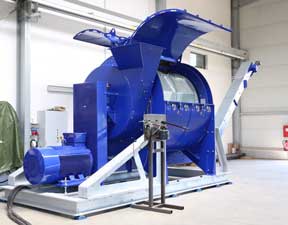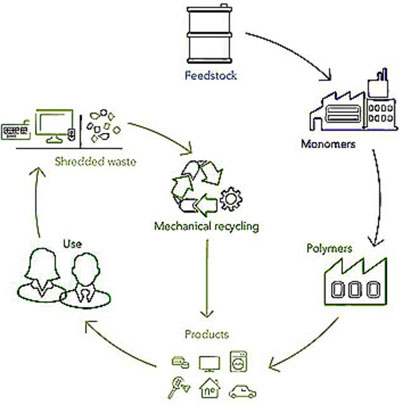Green Materials: rHDPE bottle project with Beiersdorf and Fraunhofer Institute; Barnes/Ineos Styrolution collaborate on sustainable ABS

German recycling machine maker Pla.to Technology has just presented the first industrial technology solution for the bottle-to-bottle recycling of detergent bottles made of high-density polyethylene (HDPE). The clients for this project were Beiersdorf AG and the Fraunhofer Institute for Process Engineering and Packaging.
Used shampoo and shower gel bottles have been almost entirely reprocessed without any loss of quality in a water-saving process at the Pla.to technical facility in Görlitz. The rHDPE granulate obtained from bimodal HDPE was completely reintroduced into the production cycle, producing new detergent bottles solely from recycled granulate, that meet the quality standards of new products.

With this, Pla.to offers the technology for a closed HDPE cycle – without the addition of virgin granulate necessary in other processes. “Our solution is a sustainable and water-saving method to fully recycle HDPE in large quantities,” explains Pla.to Managing Director Heinz R. Schnettler.
HDPE is very suitable for numerous applications due to its high stability and tensile strength. In the detergent industry, bottles are typically manufactured by extrusion blow moulding and have a label attached. The cap is usually made of PP.
In its in-house demonstration centre, Pla.to has reprocessed the used bottles using its own equipment. Before recycling, they are first sorted by colour with the caps and crushed using a granulator. A dry cleaner then removes residual ingredients inside the bottles without any wastewater. Stubborn contaminants are first soaked and then removed from the plastic using friction and hot water.
The label adhesive is then removed and the material is mechanically and thermally dried. Finally, the air stream of the zig-zag separator separates the bottles and caps from labels particles according to their bulk density. In order to separate the HDPE from the other components for reuse at the end, the PP is separated using near-infrared spectroscopy (NIR). After compounding, it is regranulated into rHDPE and can be directly reused to produce new bottles.
In the project, Pla.to was able to produce 20,000 bottles through this method for recycling rHDPE. These bottles have passed all the necessary tests: They are dimensionally accurate, stable, odorless and have no imperfections such as specks or inclusions. Just like containers made from virgin material, they can be labeled and close tightly with a newly applied PP cap.
“This proves that HDPE can be fully, efficiently and sustainably recycled with low wastewater on an industrial scale,” emphasises Managing Director Heinz R. Schnettler.

In other news, Molding Solutions, a strategic business unit within Barnes and pioneer of new technologies in injection moulding, and styrenics maker Ineos Styrolution say that they will collaborate on a sustainable ABS solution that will make moulding biomaterials and sustainable plastics easier.
Molding Solutions and Ineos Styrolution will bundle their extensive expertise and unique technologies to make mechanically-recycled ABS solutions easier to process and achieve repeatable molded product quality with Ineos Styrolution’s Terluran ECO MR-50/70 materials, in particular.
Yohann Bach, Product Director ABS Standard EMEA, Ineos Styrolution, says: “We are convinced that our Terluran ECO is the best mechanically-recycled ABS in the world. It offers identical properties to the respective native material. We are excited to offer it with a 50% recycling content (MR50) or with a 70% recycled content (MR70).”
Dr. Stefan Kruppa, Vice President of R&D for Molding Solutions, adds: “With our unique technology, we are able to expand our moulding capabilities of post-consumer recyclate to meet the required product quality. Our aim is to enable customers to achieve the best results in the injection moulding process with recycled ABS.”
Terluran ECO GP-22 grades were the first contribution from Ineos Styrolution to meet its pledge to incorporate at least 325 kilotonne/year of recycled materials into its products.
The two new grades, Terluran ECO GP-22 MR50 and Terluran ECO GP-22 MR70, contain 50 and 70% of recycled post-consumer waste electrical and electronic equipment (WEEE), respectively. Both grades will be available in black. Product properties of the grades match the mechanical property profile of their non-recycled counterparts.
(IMA)Subscribe to Get the Latest Updates from IMA Please click here
©2022 Injection Moulding Asia. All rights reserved.















